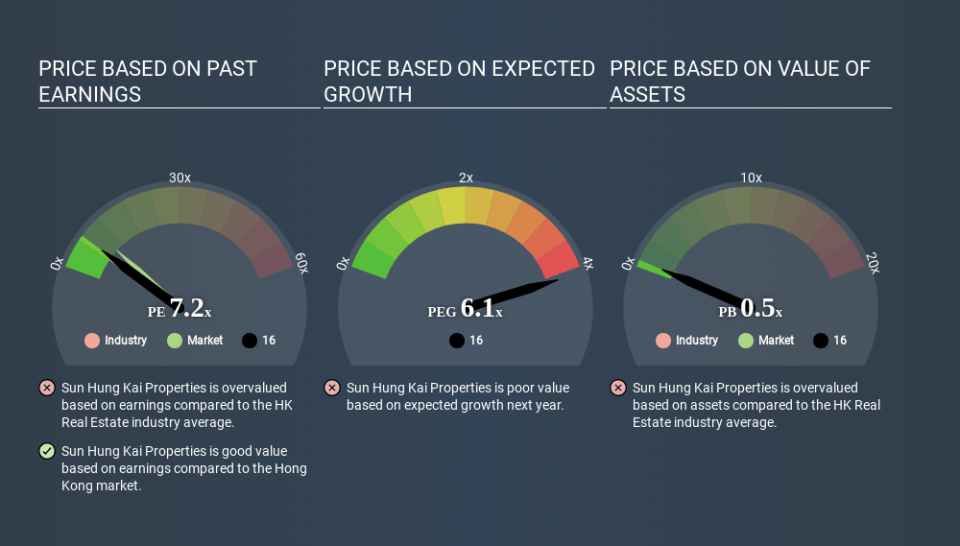Despite Its High P/E Ratio, Is Sun Hung Kai Properties Limited (HKG:16) Still Undervalued?

The goal of this article is to teach you how to use price to earnings ratios (P/E ratios). To keep it practical, we'll show how Sun Hung Kai Properties Limited's (HKG:16) P/E ratio could help you assess the value on offer. Looking at earnings over the last twelve months, Sun Hung Kai Properties has a P/E ratio of 7.15. In other words, at today's prices, investors are paying HK$7.15 for every HK$1 in prior year profit.
See our latest analysis for Sun Hung Kai Properties
How Do I Calculate Sun Hung Kai Properties's Price To Earnings Ratio?
The formula for P/E is:
Price to Earnings Ratio = Share Price ÷ Earnings per Share (EPS)
Or for Sun Hung Kai Properties:
P/E of 7.15 = HK$98.400 ÷ HK$13.757 (Based on the year to December 2019.)
(Note: the above calculation results may not be precise due to rounding.)
Is A High Price-to-Earnings Ratio Good?
A higher P/E ratio implies that investors pay a higher price for the earning power of the business. That isn't a good or a bad thing on its own, but a high P/E means that buyers have a higher opinion of the business's prospects, relative to stocks with a lower P/E.
How Does Sun Hung Kai Properties's P/E Ratio Compare To Its Peers?
The P/E ratio essentially measures market expectations of a company. The image below shows that Sun Hung Kai Properties has a higher P/E than the average (6.3) P/E for companies in the real estate industry.
Its relatively high P/E ratio indicates that Sun Hung Kai Properties shareholders think it will perform better than other companies in its industry classification. The market is optimistic about the future, but that doesn't guarantee future growth. So investors should always consider the P/E ratio alongside other factors, such as whether company directors have been buying shares.
How Growth Rates Impact P/E Ratios
P/E ratios primarily reflect market expectations around earnings growth rates. When earnings grow, the 'E' increases, over time. Therefore, even if you pay a high multiple of earnings now, that multiple will become lower in the future. A lower P/E should indicate the stock is cheap relative to others -- and that may attract buyers.
Sun Hung Kai Properties saw earnings per share improve by 6.6% last year. And earnings per share have improved by 4.5% annually, over the last five years.
Don't Forget: The P/E Does Not Account For Debt or Bank Deposits
It's important to note that the P/E ratio considers the market capitalization, not the enterprise value. Thus, the metric does not reflect cash or debt held by the company. Theoretically, a business can improve its earnings (and produce a lower P/E in the future) by investing in growth. That means taking on debt (or spending its cash).
Such expenditure might be good or bad, in the long term, but the point here is that the balance sheet is not reflected by this ratio.
How Does Sun Hung Kai Properties's Debt Impact Its P/E Ratio?
Net debt is 38% of Sun Hung Kai Properties's market cap. While it's worth keeping this in mind, it isn't a worry.
The Verdict On Sun Hung Kai Properties's P/E Ratio
Sun Hung Kai Properties's P/E is 7.2 which is below average (9.7) in the HK market. The company does have a little debt, and EPS is moving in the right direction. If you believe growth will continue - or even increase - then the low P/E may signify opportunity.
Investors should be looking to buy stocks that the market is wrong about. If the reality for a company is not as bad as the P/E ratio indicates, then the share price should increase as the market realizes this. So this free visualization of the analyst consensus on future earnings could help you make the right decision about whether to buy, sell, or hold.
You might be able to find a better buy than Sun Hung Kai Properties. If you want a selection of possible winners, check out this free list of interesting companies that trade on a P/E below 20 (but have proven they can grow earnings).
Love or hate this article? Concerned about the content? Get in touch with us directly. Alternatively, email editorial-team@simplywallst.com.
This article by Simply Wall St is general in nature. It does not constitute a recommendation to buy or sell any stock, and does not take account of your objectives, or your financial situation. We aim to bring you long-term focused analysis driven by fundamental data. Note that our analysis may not factor in the latest price-sensitive company announcements or qualitative material. Simply Wall St has no position in any stocks mentioned. Thank you for reading.

 Yahoo Finance
Yahoo Finance 
